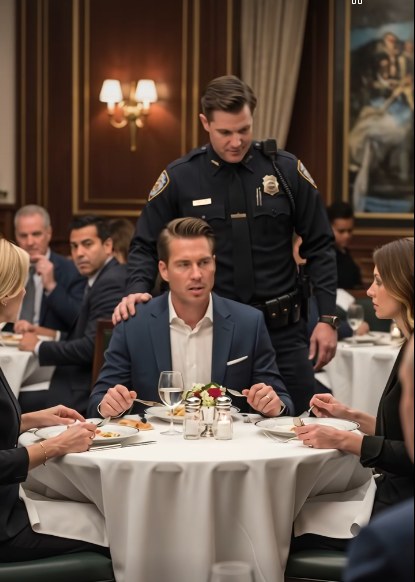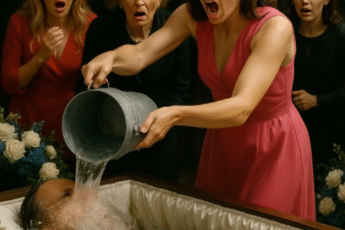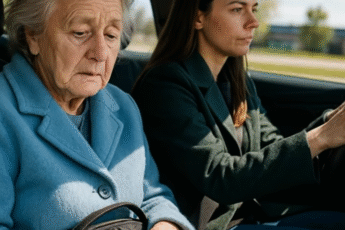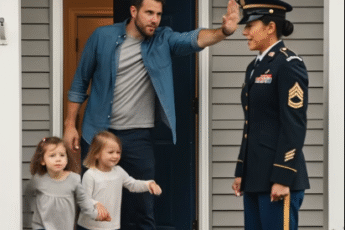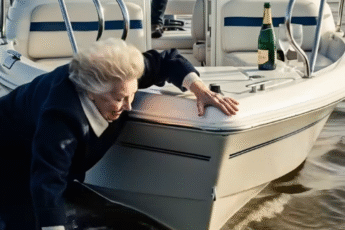The text message arrived while I was still bleeding.
Can’t leave lunch with Charlotte right now. Her ex is stalking her. Call an Uber. Sorry, babe.
I stared at my husband’s words through the spiderwebbed screen of my phone, my dislocated shoulder screaming with every shallow breath. With my one good hand, I typed back a single word: Okay.
That word would end our eight-year marriage, though Tyler didn’t know it yet. He was too busy comforting his “female best friend,” Charlotte Thomas, over her latest manufactured crisis to realize his wife was lying in Riverside General’s emergency room, choosing between rage and morphine.
This morning felt like a different lifetime. At 6:30 a.m., I’d stood in our kitchen making Tyler’s breakfast exactly how he liked it: two eggs over easy, three strips of bacon crispy enough to shatter, wheat toast with just a whisper of butter. Eight years of the same breakfast. My hands knew the motions while my mind was on the pharmacy conference dinner that night, where I was set to receive my five-year service award. Tyler had promised he’d be there. Or rather, he’d said he’d try.
“Charlotte’s having another crisis,” he’d announced over breakfast, his eyes never leaving the glow of his phone. The soft, private smile playing on his lips was the one that used to be reserved for me. Now, it belonged to her text messages.
“Another one?” I’d kept my voice neutral, cracking eggs into the pan with more force than necessary. “That’s the third crisis this month.”
“Her ex is stalking her. She’s scared, Hannah.”
Marcus, the supposed ex-boyfriend, had allegedly been stalking Charlotte for six months. Strange how the “stalking” only ever seemed to occur on Thursday afternoons, precisely during Tyler’s longest lunch break. Strange how it never quite escalated to the point of actually involving the police. I had learned, however, that defending Charlotte was Tyler’s new religion, and I was a non-believer. Instead, I just reminded him about my dinner.
His response was a dagger of predictability. “I’ll try to make it, but if Charlotte needs me…”
She would need him. She always did on Thursdays.
Six months ago, Tyler had brought Charlotte into my pharmacy at Riverside General for the first time. She’d needed anxiety medication, he said. I watched from behind the counter as she laughed, touching his arm in a way that was casual, intimate, and deeply familiar. He’d straightened the tie I’d bought him two Christmases ago after she complimented it. A peacock, preening for attention.
“She’s going through a rough divorce,” he’d explained later. “She doesn’t have anyone else she can really talk to.”
One lunch became weekly. An hour stretched to three. Always on Thursdays, when I worked my late shift. Last month, lying in bed, I could smell her perfume on his shirt—something expensive and floral that made our bedroom smell like a stranger’s.
“Do you think Charlotte might be… taking advantage of your kindness?” I’d asked, the words feeling like glass in my mouth.
Tyler had turned to me with such genuine surprise that I almost doubted myself. “Taking advantage? Hannah, she’s falling apart. Her ex is psychologically abusing her. She needs support.”
“She has a therapist. She has parents twenty minutes away.”
“But she trusts me,” he’d said, as if her trust was a sacrament more holy than our marriage vows.
The rain started during my afternoon shift, turning into a proper downpour by the time I reached my car. The conference dinner was at the Marriott downtown, a fifteen-minute drive that would now take thirty. I kept glancing at my phone in the cup holder, waiting for a text that I knew would never come.
I was thinking about what excuse I’d make for his absence when I approached the intersection at Fifth and Madison. The light was green. I was already entering the intersection when a lifted pickup truck—one of those monstrous things college boys drive—barreled through the red light. The last coherent thought I had was, He isn’t stopping.
The impact folded my car door into my ribs. The sound was wet and sharp and final. Time warped. I could see individual raindrops on what was left of my windshield. My wedding ring, a circle of gold I’d worn for eight years, was covered in blood that I knew was mine but couldn’t quite process.
The emergency room ceiling tiles came into focus slowly. Someone had once tried to make them cheerful by painting tiny clouds on them, but years of fluorescent light had yellowed them into something resembling old teeth. I counted them while Dr. Webb, a man who looked like he’d been awake for a week, manipulated my shoulder.
“This is going to hurt,” he warned. He pulled. The grinding pop of my shoulder sliding back into place sent white lightning through my entire left side, and for a moment I was somewhere else, remembering Tyler telling me, “You’re stronger than you pretend to be, Hannah,” when I’d asked him to open a pickle jar. The irony was its own kind of pain.
A nurse named Patricia, whose eyes held the weary sympathy of someone who had seen too much, confirmed my deepest fears. “Honey, we’ve tried your husband three times. It goes straight to voicemail.”
He’d turned off his phone. He had actively chosen to be unreachable while comforting Charlotte.
“Let me try,” I whispered, my good hand shaking as I typed out the message with painstaking effort: Had an accident. I’m at Riverside General ER. Dislocated shoulder, concussion. Can you come get me?
The three dots of his reply appeared and disappeared, each vanishing act a small death to the hope in my chest. Then, the final message came, a twenty-three-word wrecking ball to the architecture of our marriage. Can’t leave lunch with Charlotte right now. Her ex is stalking her. Call an Uber. Sorry, babe.
Something inside me didn’t just break; it shattered. It wasn’t my heart, not exactly. It was the fundamental belief that when it mattered, when I was bleeding and broken and reaching out for him, my husband would choose me. He would choose us.
Patricia was still watching my face, her expression one of profound, unsurprised sadness. She’d seen this story a hundred times before. “Is someone else coming for you, honey?”
I looked at Tyler’s text, then at her kind, tired eyes. “No,” I said, my voice eerily calm. “But I need to make another call.”
I found Officer Janet Morrison’s number in my contacts. She picked up her mother’s prescriptions from me every month and always asked about Tyler.
“Janet, it’s Hannah Wilson,” I said, my voice steady despite the earthquake inside me. “I’m at Riverside General. I’ve been in a car accident.”
“Hannah! Oh, honey, are you alright?”
“I will be. But I have an unusual request. My husband isn’t answering his phone, but I know exactly where he is. The Sterling Room on Fifth Street. He’s at his usual table by the window with a woman named Charlotte Thomas. Would it be possible for an officer to notify him in person? I’m just so worried he doesn’t understand how serious this was.”
There was a pause, thick with unspoken understanding. “We can certainly do that, Hannah,” she said, her tone shifting from concern to something harder, more official. “The Sterling Room, you said. We’ll send someone right over.”
“Thank you. They’re there every Thursday.”
“Every Thursday,” she repeated, and the two words carried the weight of a guilty verdict.
I lay back against the hospital pillow and closed my eyes, picturing it. The crystal glasses and starched white tablecloths. Tyler leaning forward, hanging on Charlotte’s every word. Her hand on his arm. Then, the doors swinging open and two uniformed officers walking in. The entire restaurant would fall silent, watching as they approached his table. I imagined the color draining from Tyler’s face as they explained, in loud, clear voices, that his wife had been in a serious car accident, that the hospital had been trying to reach him for hours, and that they had been dispatched to retrieve him from his… lunch.
The public humiliation was a start. The real consequences would begin tomorrow.
My younger brother, David, arrived looking like he’d driven through hell. His crisp real estate agent shirt was wrinkled, and his face was carved from stone.
“Two hours,” he said, his hand gripping mine. “Two hours I’ve been driving, worried sick. Then I get here and the nurse tells me your husband suggested you take an Uber.” He didn’t wait for my response. “Show me the messages.”
As he read, his face cycled through disbelief, then rage, then a cold, calculated fury I recognized from his business dealings. “Eight years,” he muttered. “Eight years I’ve watched him treat you like his assistant instead of his wife. This is it. We’re done.”
Before I could process it, he was on his phone, his thumbs flying. “Martinez, the locksmith. He owes me a favor. Locks changed by 8 a.m. tomorrow… And Morrison Moving? They specialize in discreet extractions. Everything of his will be boxed up by noon.”
The speed of it was dizzying. As David was architecting the dissolution of my marriage, a notification popped up on my phone. An Instagram message from Charlotte Thomas. Curiosity won over exhaustion. Reading it felt like watching the final piece of Tyler’s carefully constructed image crumble into dust.
Hannah, I am mortified. When the police arrived, I was shocked Tyler hadn’t left after your text. I asked him why he didn’t go to you, and he told me you were always exaggerating things for attention, that you were probably fine and just trying to manipulate him. He insisted you were being dramatic even after the officers explained everything. I had no idea you were actually hurt. He is no longer welcome in my life. I hope you recover quickly.
He hadn’t just dismissed me. He had actively painted me as a manipulative liar to the other woman to justify his own selfishness.
“Send me that screenshot,” David said, his voice quiet and dangerous. “Martinez is confirmed for 8 a.m.”
The next morning, the sound of Martinez’s drill was the sound of my old life being permanently sealed off. At 9:30, Morrison Moving arrived. A team of three professionals, led by a woman named Rosa, moved through our home with quiet efficiency, packing eight years of Tyler’s life into brown cardboard boxes.
My neighbor, Mrs. Chin, appeared at the door with a container of soup. “I saw the locksmith,” she said, not meeting my eye. “About time. That woman with the white BMW has been coming by on Tuesday afternoons for months now, dear. While you’re at work.”
Charlotte drove a white BMW. It wasn’t just lunch. It was our home. Our bed. The betrayal was deeper and older than I had ever imagined.
By noon, sixty-three boxes lined the entryway. David handed me a formal notice drafted by his lawyer. It was beautiful in its cold, legal simplicity. Belongings packed. Locks changed. 48 hours for retrieval. No direct contact.
I signed it. It felt like discharging a patient who had been taking up a bed for far too long.
The doorbell camera alert came at 2:47 p.m. the next day. Tyler stood on the doorstep, looking deflated. Behind him, his mother, Eleanor, approached with the determined stride of a general handling a messy retreat.
Through the camera’s speaker, I heard her sharp command: “Stand up straight, Tyler. You look pathetic.”
David answered the intercom. “Mrs. Wilson, this is David, Hannah’s brother. The boxes are in the entryway. The door will unlock remotely.”
I watched on my phone as Tyler pushed open the door and stopped dead, staring at the wall of boxes as if they were a monument to his own failure. Box by box, he carried his life out to his mother’s Mercedes. His designer clothes, his golf clubs, his expensive hobbies. On his third trip, he stopped at a box labeled “Wedding Photos,” his shoulders slumping.
“Tyler, we don’t have all day,” Eleanor’s voice cut through the air. “Charlotte has been calling you repeatedly.”
Even now. Even in the midst of this, she was still the priority.
The entire process took twenty-two minutes. Eight years of accumulation, twenty-two minutes of removal. Just before they left, Eleanor spoke into the intercom one last time. “Tyler wanted me to tell you he left his house key on the kitchen counter. Last week.”
He had already been planning his exit, long before the accident forced my hand. The knowledge didn’t hurt. It clarified.
In the months that followed, the consequences found him. My coworker texted me a picture of him drunk at a dive bar, telling strangers I’d overreacted to a “fender bender.” His father, picking up a new prescription for stress-related high blood pressure, told me Tyler now called in sick every Thursday, unable to face the day of the week that had once been his secret joy.
Two months after the accident, a three-page email arrived, a masterpiece of manipulation dressed as revelation. He was in therapy. He’d driven to the crash site and finally understood my trauma. He’d been eating “overpriced salmon” while I was “fighting for my life.” Doesn’t eight years deserve a second chance? he pleaded.
I set up a filter to send any email with his name directly to the trash.
Six months after the accident, my townhouse was filled with the sounds of genuine laughter. My mismatched thrift-store plates were piled with food David had cooked. My friends, the ones Tyler had called unsophisticated, were telling stories. The scars on my forehead had faded to thin silver lines, reminders not of trauma, but of survival.
The following Thursday, I sat on my couch, the afternoon sun warming my face. The house was quiet. A book lay open in my lap. For the first time in years, a Thursday afternoon was not a source of anxiety, but a source of peace. It was just an afternoon, empty of obligations and full of possibilities. I was alone, and I was happy. Genuinely, completely, peacefully happy. The collision had nearly taken my life, but in the end, it had given it back to me.
